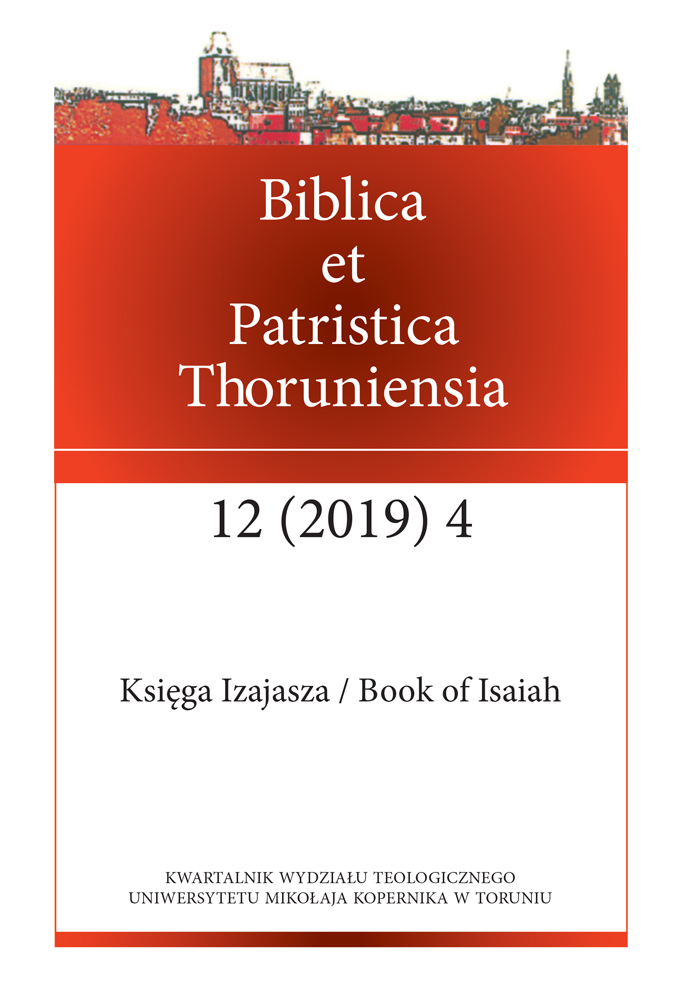The Theological Message of the Fourth Servant Song (Isa 52:13–53:12) in Light of Its Structure
DOI:
https://doi.org/10.12775/BPTH.2019.022Keywords
Deutero-Isaiah, Fourth Servant Song, rhetorical analysisAbstract
The article aims to analyse the structure of Isa 52:13–53:12 deploying elements of the analysis of the biblical and Semitic rhetoric developed by Roland Meynet. The article begins with an overview of earlier scholarly suggestions concerning the structure of the Fourth Servant Song, including Meynet’s. The major part of the article constitutes a rhetorical analysis of the song, first as a whole and then within its individual rhetorical units. In the final part of the article, major theological motifs of the song are presented, which are part of a new vision of suffering and death in the context of the Old Testament.
References
Baltzer, K., Deutero-Jesaja (KAT 10/2), Gütersloh: Gütersloher Verlagshaus, 1999.
Barré, M.L., Textual and Rhetorical-Critical Observations on the Last Servant Song (Isaiah 52,13–53,12), CBQ 62 (2000) 1–27.
Barthélemy D., Critique textuelle de l’Ancien Testament. 2. Isaïe, Jérémie, Lamentations (OBO 50/2), Göttingen: Vandenhoeck & Ruprecht, 1986.
Berges U., Jesaja 49–54 (HThKAT), Freiburg–Basel–Wien 2015.
Blenkinsopp, J., Isaiah 40–55. A New Translation with Introduction and Commentary (AB 19), New York: Doubleday, 2000.
Bonnard, P.-E., Le Second Isaïe, son disciple et leur éditeurs. Isaïe 40–60 (Études bibliques), Paris: J. Gabalda, 1972.
Brzegowy, T., Prorocy Izraela, I, Tarnów: Biblos, 1994.
Cazelles, H., Les Poèmes du Serviteur. Leur place, leur structure, leur théologie, RSR 43 (1955) 5-51.
Ceresko, A.R., The Rhetorical Strategy of the Fourth Servant Song (Isaiah 52,13–53,12). Poetry and the Exodus-New Exodus, CBQ 56 (1994) 42–55.
Childs, B.S., Isaiah (OTL), London–Leiden: Westminster John Knox, 2001.
Conroy, C., The ‘Four Servant Poems’ in Second Isaiah in the Light of Recent Redaction-Historical Studies in Biblical and Near Eastern Essays. Studies in Honour of Kevin J. Cathcart, ed. C. McCarthy and J.F. Healey (JSOTSup 375), London: T & T Clark, 2004, 80–94.
Coppens, J., Le Messianisme et sa relève prophétique. Le anticipations propétiques, leur accomplissement en Jésus, Gembloux: Duculot, 1974.
Duhm, B., Das Buch Jesaja (HAT 3/1) Göttingen: Vandenhoeck & Ruprecht, 1892.
Freedman D.N., Lundbom J., dôr, in TDOT, III, 169–181.
Grelot, P., I canti del servo del Signore. Dalla lettura critica all’ermeneutica (Studi Biblici 9), Bologna: EDB, 1983.
Marconcini, B., Księga Izajasza (Rozumieć Stary Testament), Kraków: Wydawnictwo M, 2000.
Meynet, R., Le quatrième chant du Serviteur Is 52,13–53,12, Gregorianum 80 (1999) 407–440.
Meynet, R., Wprowadzenie do hebrajskiej retoryki biblijnej (Myśl Teologiczna 30), Kraków: WAM, 2001.
Orlinski, H.M., The so-called ‘Servant of the Lord’ and ‘Suffering Servant’ in Second Isaiah in Studies on the Second Part of the Book of Isaiah (VTSup 14), Leiden: Brill, 1977, 3-133.
Oswalt, J.N., The Book of Isaiah. Chapters 40–66 (NICOT), Grand Rapids: Eerdmans, 1998.
Orlinski, H.M., The so-called ‘Servant of the Lord’ and ‘Suffering Servant’ in Second Isaiah in Studies on the Second Part of the Book of Isaiah (VTSup 14), Leiden: Brill, 1977, 3-133.
Paściak, J., Izajasz wieszczem Chrystusa (Attende Lectioni 12), Katowice: Wydawnictwo św. Jacka, 1987.
Raabe, P.R., The Effect of Repetition in the Suffering Servant Song, JBL 103 (1984) 77–84.
Schenker, A., Knecht und Lamm Gottes (Jesaja 53). Übernahme von Schuld an Horizont der Gottesknechtslieder (SBS 190), Stuttgart: Verlag Katholisches Bibelwerk, 2001.
Snaith, N.H., Isaiah 40–66. A Study of the Teaching of the Second Isaiah and Its Consequences in Studies on the Second Part of the Book of Isaiah (VTSup 14), Leiden: Brill, 1977, 139-146.
Stachowiak, L., Księga Izajasza II–III (40–60). Wstęp – przekład z oryginału – komentarz – ekskursy (PŚST 11/2), Poznań: Pallottinum, 1996.
Westermann, C., Isaiah 40–66. A Commentary (OTL), London: SCM, 1969.
Whybray, R.N., Isaiah 40–66 (NCBC), Grand Rapids: Eerdmans, 1975, 169–170.
Downloads
Published
How to Cite
Issue
Section
License
CC BY ND 4.0. The Creator/Contributor is the Licensor, who grants the Licensee a non-exclusive license to use the Work on the fields indicated in the License Agreement.
- The Licensor grants the Licensee a non-exclusive license to use the Work/related rights item specified in § 1 within the following fields: a) recording of Work/related rights item; b) reproduction (multiplication) of Work/related rights item in print and digital technology (e-book, audiobook); c) placing the copies of the multiplied Work/related rights item on the market; d) entering the Work/related rights item to computer memory; e) distribution of the work in electronic version in the open access form on the basis of Creative Commons license (CC BY-ND 3.0) via the digital platform of the Nicolaus Copernicus University Press and file repository of the Nicolaus Copernicus University.
- Usage of the recorded Work by the Licensee within the above fields is not restricted by time, numbers or territory.
- The Licensor grants the license for the Work/related rights item to the Licensee free of charge and for an unspecified period of time.
FULL TEXT License Agreement
Stats
Number of views and downloads: 1315
Number of citations: 0



